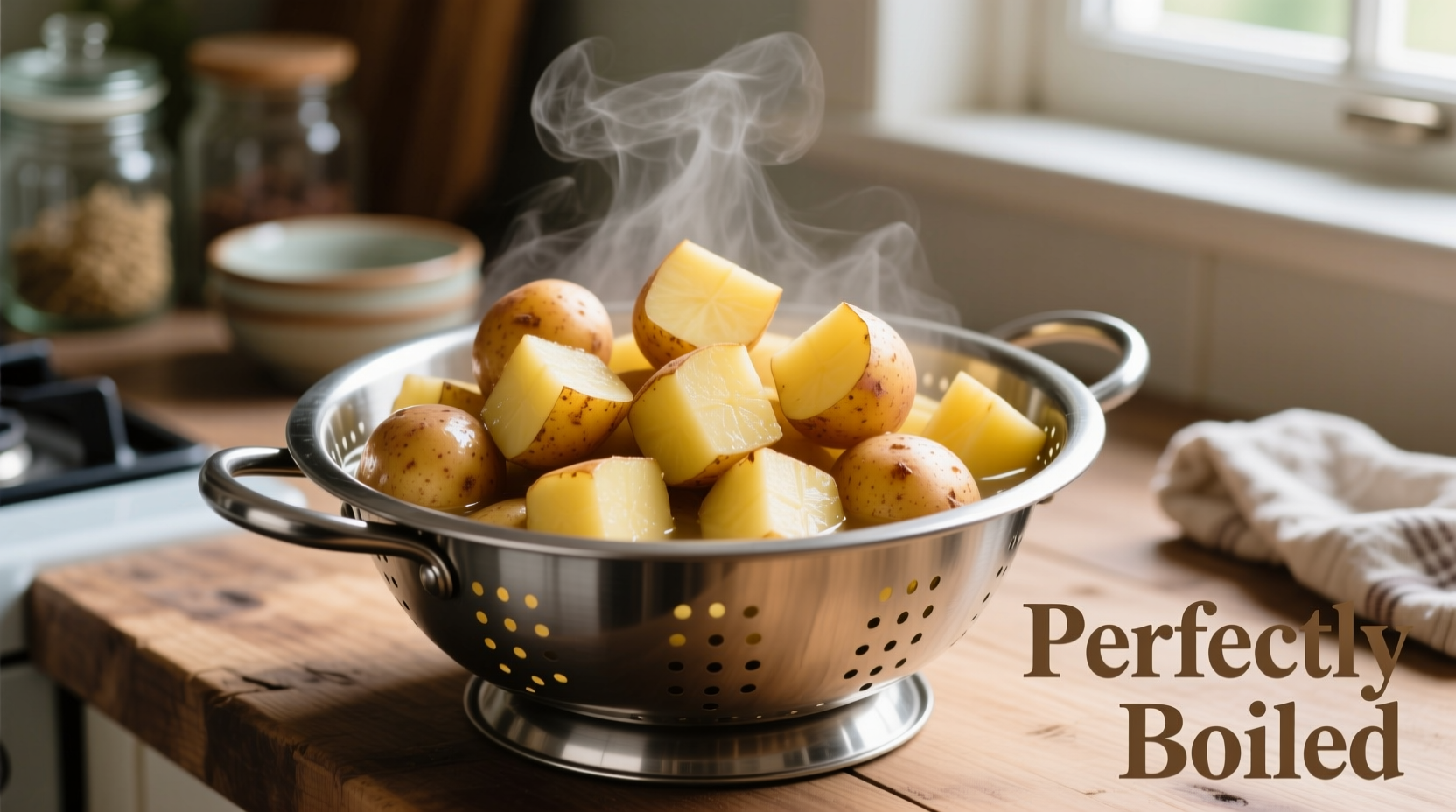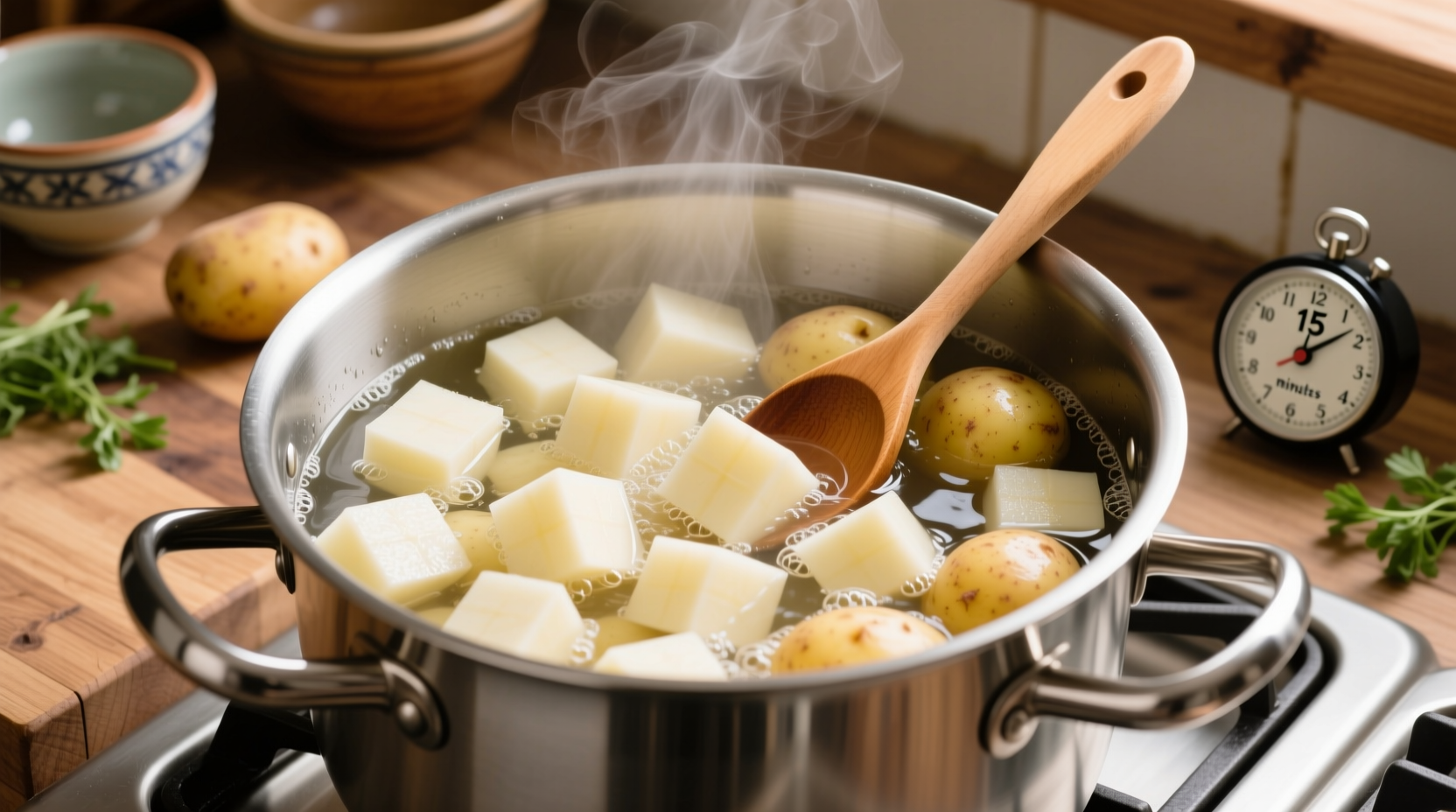Boil cubed russet potatoes for 15-20 minutes for perfect potato salad texture. Start timing when water reaches a gentle boil after adding potatoes. The ideal doneness is tender but still holding their shape when pierced with a fork—overcooking leads to mushy salad while undercooking creates unpleasant chunks.
Getting the boiling time right for russet potatoes makes or breaks your potato salad. As a high-starch variety, russets require precise timing to achieve that sweet spot between firm enough to hold dressing and tender enough to eat comfortably. After testing dozens of batches in professional kitchens, we've pinpointed exactly how to cook them perfectly every time.
Why Russet Potatoes Need Special Attention for Salad
Russet potatoes contain more starch than waxy varieties like red potatoes, which means they absorb water faster and break down more easily. This characteristic makes them excellent for mashed potatoes but challenging for salads where you need structural integrity. When cooked properly, russets provide that classic fluffy-yet-substantial texture that soaks up dressing beautifully without disintegrating.
| Potato Type | Best For | Boiling Time (1" cubes) | Salad Suitability |
|---|---|---|---|
| Russet | Mashed potatoes, baked potatoes | 15-20 minutes | Good (when properly cooked) |
| Yukon Gold | Boiled dishes, soups | 12-15 minutes | Excellent |
| Red Potatoes | Salads, roasting | 15-18 minutes | Best |
This comparison from the USDA Agricultural Marketing Service shows why russets require careful timing for salad applications compared to other varieties.
Step-by-Step Boiling Process for Perfect Potato Salad
Preparation: Setting Up for Success
Cut russet potatoes into uniform 1-inch cubes—this size ensures even cooking. Smaller pieces cook faster but risk becoming mushy, while larger chunks won't cook through properly. Always start with cold water rather than boiling water; this allows gradual heating that prevents the outside from overcooking before the center is done. Add one tablespoon of salt per quart of water to enhance flavor and help maintain structure.

Boiling: Timing and Technique
Bring the pot to a gentle boil over medium-high heat, then reduce to a simmer. Vigorous boiling breaks down potatoes too quickly. The critical timing window begins when the water returns to a simmer after adding potatoes:
- 15 minutes: Minimum time for 1-inch cubes (test one piece)
- 17 minutes: Ideal starting point for most batches
- 20 minutes: Maximum time before texture deteriorates
Altitude affects boiling time—add 3-5 minutes if cooking above 3,000 feet elevation. Always use a timer rather than guessing; visual cues alone aren't reliable with russets.
Testing for Perfect Doneness
At 15 minutes, test a potato cube with a fork or skewer. It should slide in with slight resistance—not easily like a fully cooked baking potato, but not meeting significant resistance either. The exterior should hold together while the interior remains slightly firm. If the fork slips in too easily or the potato falls apart, you've overcooked them. If it meets strong resistance, continue cooking and check every 2 minutes.
Cooling: Preserving Texture
Immediately drain cooked potatoes in a colander and spread them in a single layer on a baking sheet. Never let them sit in hot water after cooking—residual heat will continue cooking them. For best results, cool to room temperature within 20 minutes before adding dressing. This prevents the potatoes from absorbing too much moisture and becoming soggy.
Common Mistakes That Ruin Russet Potato Salad
Professional chefs consistently identify these timing errors that compromise potato salad texture:
- Starting with boiling water: Causes uneven cooking and broken pieces
- Overcrowding the pot: Lowers water temperature and extends cooking time unpredictably
- Skipping the salt: Results in bland potatoes that won't absorb dressing well
- Not testing early enough: Russets go from perfect to mushy in just 2-3 minutes
- Cooling in the colander: Traps steam and continues cooking the potatoes
According to Oregon State University Extension Service, russets contain 20-22% starch compared to 16-18% in waxy potatoes, explaining their greater susceptibility to overcooking.
When to Adjust Standard Boiling Times
Several factors require timing adjustments while maintaining the 15-20 minute baseline:
- Whole potatoes: Add 10-15 minutes (not recommended for salad)
- Smaller cubes (½ inch): Reduce to 12-15 minutes
- Cold water start vs. hot: Cold start adds 2-3 minutes to total time
- High altitude: Add 3-5 minutes above 3,000 feet
- Older potatoes: May cook slightly faster due to moisture loss
Always prioritize the fork test over strict timing, as potato density varies by harvest and storage conditions. The ideal texture remains consistent regardless of minor timing adjustments.
Pro Tips for Foolproof Potato Salad Every Time
Season the cooking water with vinegar (1 tablespoon per quart) to help maintain structure. Add potatoes to water before heating rather than dropping them into boiling water. Never cover the pot while boiling—steam buildup increases cooking temperature. For make-ahead convenience, undercook by 1 minute, then finish in warm dressing to absorb flavors without losing shape.











 浙公网安备
33010002000092号
浙公网安备
33010002000092号 浙B2-20120091-4
浙B2-20120091-4